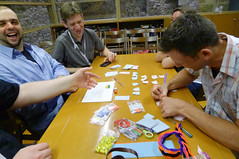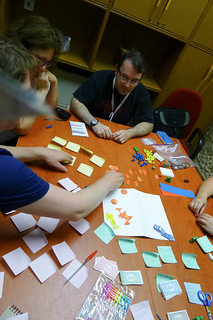 This year at the FDG Conference we had a mini game jam, where we made board game prototypes with the theme "The Academic Game".
This year at the FDG Conference we had a mini game jam, where we made board game prototypes with the theme "The Academic Game".Background
I was having breakfast with my friend Magy, who is heading up a game research group at Northeastern, at GDC this spring. Magy was describing an interesting situation at her department. It was about getting more office space.
- So did you deploy a suit? I asked.
- Yeah, actually I did!
As we continued catching up, we realised we were both thinking in terms of game mechanics regarding the everyday life at our respective universities. So we started to model The Academic Game. We also thought it could be a fun theme to have for the hands-on part of the Global Game Jam Workshop I was helping to organise for the Foundations for Digital Games Conference (FDG).
Preparations
It turned out we only had a half-day for the GGJ Workshop, but the chairs of the FDG Conference (Georgios, Mark and Julian) thought our proposal had merit and cleared us for a few hours in the schedule. We got a half-day, but the only available room had space for max 15 people.
Magy came to visit me on Malta, just before FDG. We spent some time preparing the mini-jam. Since there was so little time for the actual jam- only a few hours - we thought we could give the groups a flying start by giving some tokens of inspiration to use.
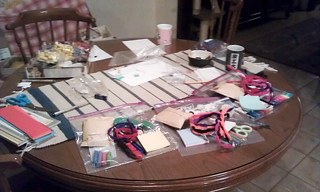
In the beginning of the FDG conference we sent out an invite:
Mini-Game Jam!
Story of our lives: how do we use resources, like our time and funds to create the best possible research? While we at the same time deal with office politics - perhaps we are waging an office space war!
Lets get together and model The Academic Game in a mini game jam/game design workshop at FDG!
We have put together a starting kit of props (such as “Dean”, “Study-Unit”, “Post-Doc”, “office space”, “staff in University Council”, “Journal Article”, “Conference chairing” etc), in order to give us a flying start!
Ideally we will, in the end of the session, have two or three Games of the Academy that we can play with our friends, family, and industry partners! Perhaps they will understand us better after having played with us!
There is a limited number of spots for this session - we can be max 15 people, so make sure to send an email to mirjam.eladhari[at]um.edu.mt to secure your spot! We have the Friday-morning session for this.
The mini game jam
The Mini Jam happened on Friday the 17th of May in Chania, on Crete, at 10.20 to 13.00.
The setting for the prototyping session was to
We have put together a starting kit of props (such as “Dean”, “Study-Unit”, “Post-Doc”, “office space”, “staff in University Council”, “Journal Article”, “Conference chairing” etc), in order to give us a flying start!
Ideally we will, in the end of the session, have two or three Games of the Academy that we can play with our friends, family, and industry partners! Perhaps they will understand us better after having played with us!
There is a limited number of spots for this session - we can be max 15 people, so make sure to send an email to mirjam.eladhari[at]um.edu.mt to secure your spot! We have the Friday-morning session for this.
Mirjam P Eladhari and Magy Seif El-Nasr
The mini game jam
The Mini Jam happened on Friday the 17th of May in Chania, on Crete, at 10.20 to 13.00.
The setting for the prototyping session was to
- create a board- or card game, and
- the theme was “The Academic Game”.
We had sets of prototyping materials prepared and sets of "academic" tokens that we'd made. The tokens were just for inspiration, participants were by no means required to use them.
We started with a brainstorming session, then the participants formed two groups according to which of the ideas they'd rather develop. During the brainstorming session the participants were examining the premade tokens in parallel to whatever they were doing, and when it was prototyping time they were mostly abandoned and the groups made their own tokens.

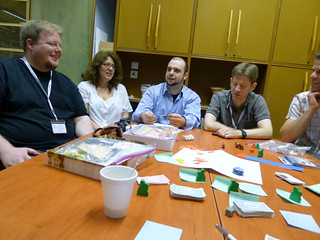
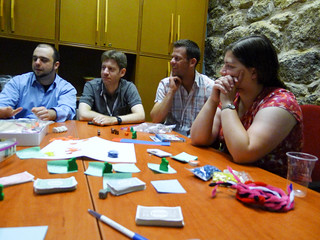
Two prototypes where made, one which was playable already by lunchtime!
At some point Alessandro wandered into the room of one of the groups and started to take notes on quantities of usages of certain words. Interestingly he found that some words were used very frequently such as "student", "dean", "publications", "prestige" and "cooperation", while other words, that he expected, were not uttered at all, such as "time" and different words that would be associated to quality of life.
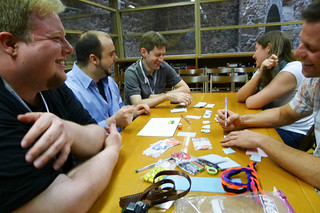

In retrospect
What was most remarkable to me in the mini-jam was that the participants managed to create playable paper prototypes in just two hours. I speculate that it could be because the knowledge domain was so well known to the participants that they were able to quickly model the mechanics. On the other hand, the majority of the participants are experienced in game design, and here they were given a theme relevant to their every-day lives.
I found it interesting to see how other scholars were thinking about the mechanics of the Academic Game, and what sorts of tokens they would want to make. The actual modelling work is enlightening too. For example, of one were to only model what actions are most efficient for career advancement it turns out that quality of teaching has no impact (bad teaching is not acceptable, but system wise outstanding teaching gives no other reward than the satisfaction of a job well done). Another interesting aspect was what type of winning criteria people formulated. This permeated many of my discussions with others who know about the jam afterwards. People have so different views - but often very clear - on why they play the game in the first place; whether it is to level up as individuals within the ranking system of their organisation, to maximise the quantity of research output for example, or to find ways to make research with as big impact as possible, or quietly create high quality work. Another dichotomy is whether people strive for individual success or success for their students or their department. In all cases, the discussions have been interesting and enlightening.
Magy and I have gotten from only thinking about our own game prototype to see how the aspect of the actual modelling of the Academic Game can be useful for others besides ourselves. There are so many differences between countries, cultures, academic subjects and roles - and if modelled as a game the rules of a particular organisation become very clear. Modelling games is an excellent way to, together, create a deeper understanding of how a system works and what affordances one's own role in it holds. It can also be enlightening at a personal level, to ponder on what long term goals may be worthy of pursuit. Not to mention getting a deeper understanding for the actions of one's' colleagues. For new faculty it can be educational to play an existing academic came with their new colleagues, or for a PhD student to understand academia in the first place.
At any rate, we all had a really good time at the mini-jam, and I have understood that the groups keep in touch, thinking to further develop their prototypes.
Here are some more photos from the mini jam: Photo set at Flickr The Academic Game Jam at FDG13



Two prototypes where made, one which was playable already by lunchtime!
At some point Alessandro wandered into the room of one of the groups and started to take notes on quantities of usages of certain words. Interestingly he found that some words were used very frequently such as "student", "dean", "publications", "prestige" and "cooperation", while other words, that he expected, were not uttered at all, such as "time" and different words that would be associated to quality of life.


In retrospect
What was most remarkable to me in the mini-jam was that the participants managed to create playable paper prototypes in just two hours. I speculate that it could be because the knowledge domain was so well known to the participants that they were able to quickly model the mechanics. On the other hand, the majority of the participants are experienced in game design, and here they were given a theme relevant to their every-day lives.
I found it interesting to see how other scholars were thinking about the mechanics of the Academic Game, and what sorts of tokens they would want to make. The actual modelling work is enlightening too. For example, of one were to only model what actions are most efficient for career advancement it turns out that quality of teaching has no impact (bad teaching is not acceptable, but system wise outstanding teaching gives no other reward than the satisfaction of a job well done). Another interesting aspect was what type of winning criteria people formulated. This permeated many of my discussions with others who know about the jam afterwards. People have so different views - but often very clear - on why they play the game in the first place; whether it is to level up as individuals within the ranking system of their organisation, to maximise the quantity of research output for example, or to find ways to make research with as big impact as possible, or quietly create high quality work. Another dichotomy is whether people strive for individual success or success for their students or their department. In all cases, the discussions have been interesting and enlightening.
Magy and I have gotten from only thinking about our own game prototype to see how the aspect of the actual modelling of the Academic Game can be useful for others besides ourselves. There are so many differences between countries, cultures, academic subjects and roles - and if modelled as a game the rules of a particular organisation become very clear. Modelling games is an excellent way to, together, create a deeper understanding of how a system works and what affordances one's own role in it holds. It can also be enlightening at a personal level, to ponder on what long term goals may be worthy of pursuit. Not to mention getting a deeper understanding for the actions of one's' colleagues. For new faculty it can be educational to play an existing academic came with their new colleagues, or for a PhD student to understand academia in the first place.
At any rate, we all had a really good time at the mini-jam, and I have understood that the groups keep in touch, thinking to further develop their prototypes.
Here are some more photos from the mini jam: Photo set at Flickr The Academic Game Jam at FDG13
